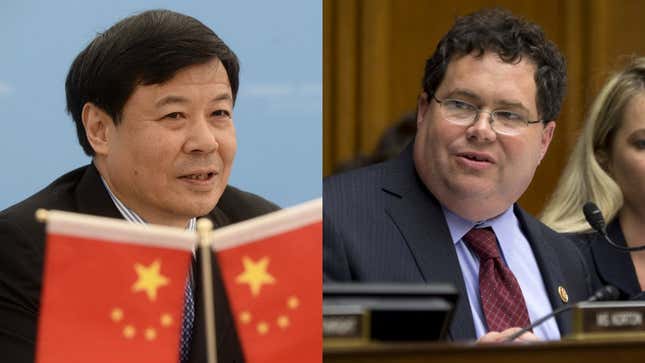
The Tea Party politicians who are taking the US government to the brink of default are getting some heat from the land where tea began. Chinese Vice Finance Minister Zhu Guangyao, anxious that a US default that would affect China’s $1.28 trillion in US Treasurys, lashed out at “the attitude of the Tea Party,” in a press briefing on Tuesday—and the Tea Party lashed right back.
“They need to stay out of our politics,“ Texas Republican Rep. Blake Farenthold told Bloomberg. Florida Republican Rep. Ted Yoho added that China’s criticism “almost sounds like a threat.”
In reality there is little that China or any country can do to prod Washington toward a deal that would extend the US government’s borrowing limits. As the backlash from Republicans illustrates, singling out the Tea Party may have the opposite effect. Yoho was one of the conservative House Republicans who helped to shoot down a last-minute proposal from the GOP leadership that would have re-opened the government and ensured that the US is able to repay its creditors.
As Quartz has reported, China’s threat to buy fewer US Treasurys is an empty one; despite its best efforts and intentions, it has been unable to significantly diversify out of US government debt. The alternative locations for its growing pile of foreign reserves—commodities, real estate, euro-denominated bonds and the like—simply aren’t large or liquid enough.
That perhaps explains the frustrated tone of China’s state media in the lead-up to Thursday’s debt ceiling deadline. An editorial in the state-run news service Xinhua called this week for a “de-Americanized world,” with a laundry list of accusations against US foreign and economic policies. “Most recently, the cyclical stagnation in Washington for a viable bipartisan solution over a federal budget and an approval for raising debt ceiling has again left many nations’ tremendous dollar assets in jeopardy and the international community highly agonized,” Xinhua writer Liu Chang wrote.
As for the policymakers in Beijing, there seems to be a begrudging acceptance that China, along with much of the world economy, is stuck on the sidelines watching as the remaining hours before the deadline tick away.
“We demand that the US side, as the issuing country of the major reserve currency and the largest economy in the world … should undertake its due responsibility,” Vice Finance Minister Zhu said. “That is to uphold and develop the stability of international financial markets.”
An earlier version of this post incorrectly referred to China’s $1.28 billion in US Treasury holdings, instead of $1.28 trillion.



